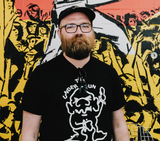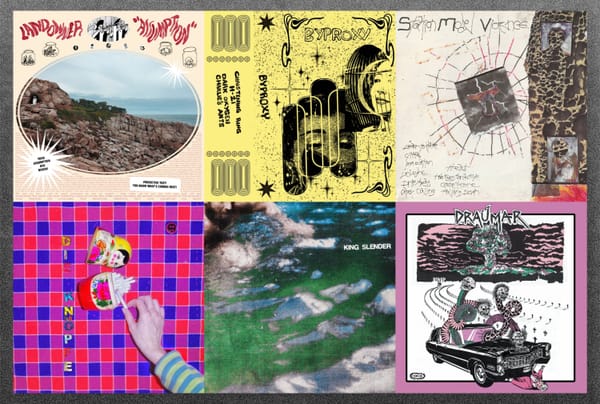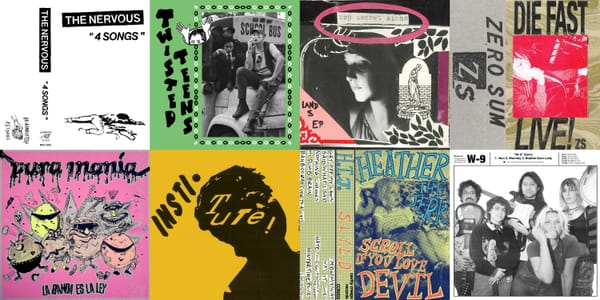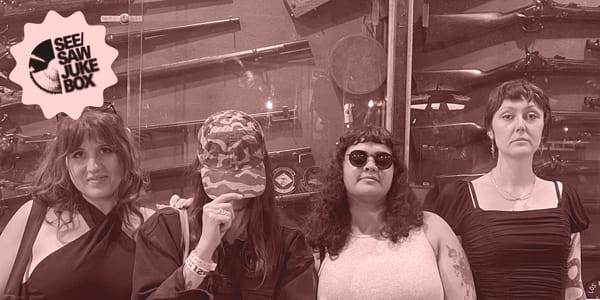the submissives’ deb edison is finally ready to look back
Recorded in 2017, Live at Value Sound Studios is one of the year’s best albums. Once intentionally shrouded in mystery, the band’s leader and songwriter now reveals the journey that led to its release.
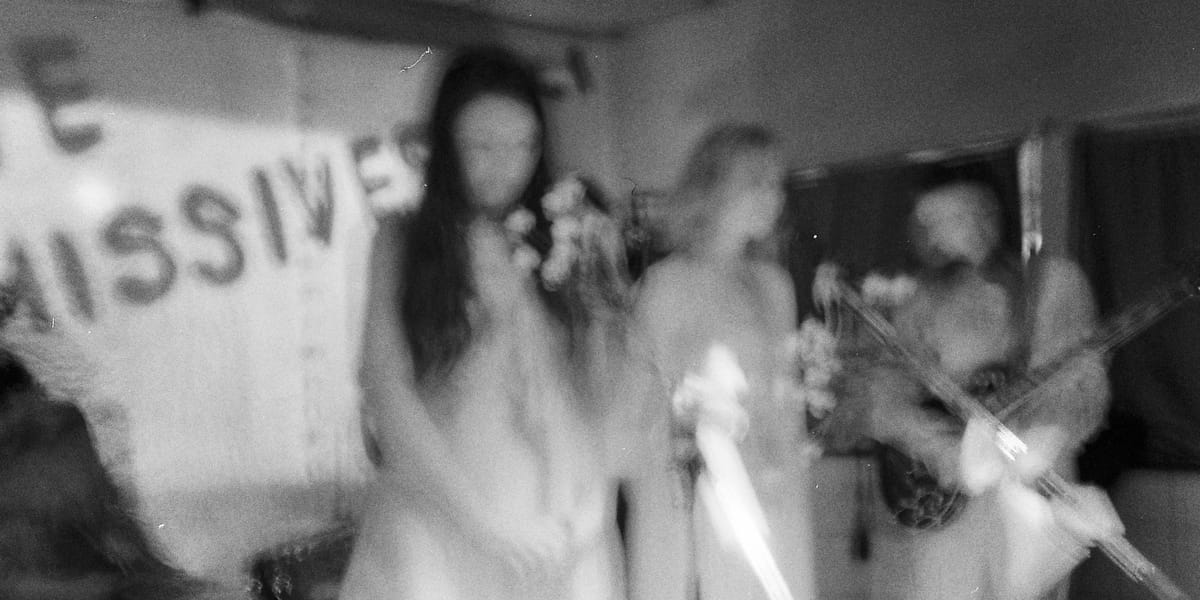
“I never really did interviews in the past, but it’s a different phase of this band,” says the artist known as Deb Edison. “For some reason I want to now.” Things have changed in the last several years for the Montreal songwriter. She started the Submissives in 2014 at age 24 hellbent on keeping things mysterious. “I was really intense about what I wanted to do,” she said. “It was kind of fun for me to just see what people would say about it without giving much information.”
After a series of solo releases under the Submissives name, she got the live band together to record a proper album. Live at Value Sound Studios, released last week on Celluloid Lunch, is one of the best albums of the year, and it’s been gestating since the initial sessions in 2017. It was recorded in Edison’s boyfriend’s house studio in northern Montreal. Posted up in the basement for two days, the album was recorded in a single take. The album was mastered soon after they finished recording, but then it sat in the vault for seven years.
Speaking over video chat from Montreal, Edison revealed a tangled relationship with making records versus releasing them. Part of that is due to her nature of embracing the creation and not caring as much about putting out a finished product, but Live at Value Sound Studios was also one of the last records she made before committing to sobriety. For a long time, she needed to distance herself from the person who made these records. Now, she’s in a place where she wants her work to see the light of day.
What do you remember about making this record?
My current boyfriend, Rene Wilson is his music name, being a recording engineer is the only job he’s ever had in his life for like 20 years even though he’s only 35. He started when he was 15 in Edmonton. He was living at this house up north in Montreal; it’s super rare to find a house. The city is mostly apartments, so if you know someone who rents a house it’s crazy. He and his good friend Garrett Johnson started the studio when they moved here in 2014, and both of them were super intense.
They recorded reel to reel. This record was completely analog. The entire house, there’s amps in rooms and closets and everything is isolated. It was a really exciting development in the city. I moved here in 2008 and it was just a really exciting change. Rene still lives in that house and records to this day. Garrett Johnson recorded it and I exchanged some furniture finishing work for the recording. I’m pretty sure we didn’t do any second takes. We did the whole thing in maybe two days.
For me, the Submissives is my first pop band. That was sort of the experiment of it because before that point, I was doing punk bands and hardcore and then got more into noise and jazz. Basically I was just really frustrated because the scene was very much a boys club sort of thing. The very few DIY venues in the city would always be the same boring ass poppy bands and that’s when Mac DeMarco moved here. He was friends with Garrett and Rene from their hometown, but he moved here and then it was all about Mac DeMarco and the associated projects. I was just like, “God damn, these fucking dudes!”
So I was like, I should start a really poppy, boring, formulaic band and just try to conform. I just got more serious about it, then it picked up some traction in the city. I’m happy with how it’s turned out. I don’t think I compromised my vision or my music values. I don’t even know what that means, but I feel like I didn’t compromise. It still hit in and interesting way and it became a popular band here. I was like, “Ugh, of course, when I do this thing people like it.” Then I sort of became addicted to writing these easy pop songs, and then I was like, “Uh oh, I’m too far in this direction.” And then projects after that, I’m sort of reversing course and trying to deconstruct.
I’m curious what some of your touchstones are as a songwriter—what kind of music were you trying to evoke?
I was dating this guy Matt from age 17 until around then. He lives in New York but he’s a punk guy, and I don’t know, they have rules of how to operate in the punk scene. How you look, what you like, and stuff. I was getting really tired of it. It’s like, “Who are you kidding? You guys are all conforming and some of you act like fascists even though you’re so against fascism.” That’s a whole other story. But I was getting really tired of that scene. I had definitely grown out of it.
I’m six years sober now, so when we recorded that, that was my last year of being really fucked up all the time. It was definitely a huge transition time. I have this other band called Gashrat, and some of my friends were like, “What are you doing, [Deb]? What is this bullshit? Why are you part of other scenes?” And I wanted to push into other places and I wanted to try to change things.
For two years, you know Joe Meek, the producer? I was a huge Joe Meek fan, just his ethos and his intensity and his way of producing. He did a lot of things that were new and he was really secretive. He was really a force and also kind of a creepy…it’s pop mixed with a disconcerting feeling is what I really was into. Happy and joyful, but something’s off about it. It’s all over the Submissives lyrics, but like “I’m a woman and I’ll do anything for my man, I don’t care, I’ll die for you, that’s my purpose.” I’d say Joe Meek, the girl group production, and more than even the music itself, but how it was produced and the stories behind those musicians and producers.
It’s interesting to have those lyrics be a reaction not only to music in a historical context but also what was actively happening in your city’s scene.
Definitely the reason this band started was fully reactionary. I’ve probably been in like 30 bands or maybe more at this point. I have probably four solo recording projects. Some I haven’t released, but it’s always because I go to a show and I’m like, “Fuck these people.” I love my friends but it’s more like, “Come on guys, what are you doing? Let’s push it.” I don’t say that out loud, but we have to try harder here. We have to challenge ourselves. We can’t just be regurgitating the same ideas. You can’t just do something trendy and be like, “I’m gonna get popular!” I’m more of an art person. I went to art school. I look at it from that place and I’ve been playing music since I was a baby, so it’s natural for me to come from a different angle or make it more conceptual.
To that point of it being more conceptual, you’re credited as Deb Edison. Why did you want to have a pseudonym?
I never wanted my real name associated with any projects. I’m really into doing comedy with my friends and videos. I have different alter egos, like this character Rodna Howard is another one. It’s hard to explain. When I started making pseudonyms, I had the future in mind, and now that the future is here I’m like, “Whoa, that was crazy.” If I had a new idea or a new project, I’d be like, “I guess this fits in with that alter ego.” It’s mostly I didn’t want myself to be associated. One of my other bands, we would always cover our faces and I never really put any information out there about us. This was my fantasy and it actually happened. Somebody came up to my friend in the band and was like, “Did you see that band? They sucked.” But yeah, it’s like a prank in a way—this big web of confusion.
There’s not enough of that.
I agree. People want to be famous, I guess. I definitely don’t personally want me as a person to be famous, but if it happened to Deb Edison, it would be another avenue to prank people.
This record was recorded seven years ago. Why did it take so long for it to come out?
There is no real good answer for that. My band Gashrat, we released our first LP in 2014 and recorded the next one a year later but never put it out. If I get working on it now, it’ll be 10 years. Like many of my friends, I was diagnosed with ADHD. I have that thing of finishing something to 99% and saying “I don’t care anymore.” It’s more about making it. It’s less about the putting it out, unfortunately. I initiate things and I get things going and then right at the end I just lose interest.
Ever since I got sober, every year has been an improvement. I made a big list of all those unfinished projects. This is just me checking this off the list. After we play a show on September 6th and release physical copies for Montrealers, this will be done finally. It’s going to feel so good. But there’s no good reason. It kind of works, though. The content, the lyrics and stuff are all timeless. It could come out in 20 years, I think, and still work.
You mentioned that this record was made in a space right before you got sober. How is it to go back and revisit work by that version of you?
We got it mastered by my friend very soon after we got the mixes and it was ready to go a couple weeks after we recorded. Maybe partly the reason is when I got sober, I just sort of abandoned everything. A lot of that stuff had been so important to me. The Submissives, for example, I was so militant about the idea. When we play live, no one smiles, there’s no banter. It’s really orchestrated and everyone in the band is really down with it. Everyone is really good, we all decide what we’re going to wear, we decide our attitude, or what the concept is even if it’s just in our heads.
Getting sober, everything changed and those things that were so important to me, that part of it, it just completely changed. Everything just kind of lost its meaning. The way I was living was totally false in a way for a while. As soon as I got sober I just stopped recording. I mean, COVID happened too, so things were crazy. I haven’t really spoken this in words that much, but I just lost that passion because it was built on this lie of getting drunk. It took a couple years, but now it’s more intense than it was.
It’s hard to describe, but the idea of releasing it kind of became way more important to me about a year ago. I listened to it and was like, “Wow, it’s actually good.” I kind of just wrote it off in my mind. Things lost meaning and I had to sort of find myself again. Now that I think I have, as time goes on, it makes more sense now. I haven’t recorded since I got sober, pretty much. I think I’m ready.
see/saw is a reader-supported publication. If you enjoyed this article, please consider a subscription to support this independent punk journalism operation.

